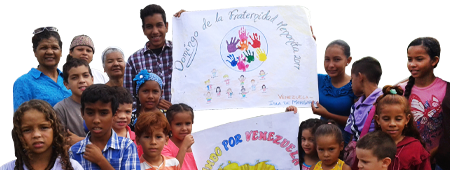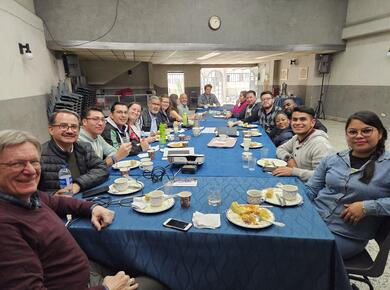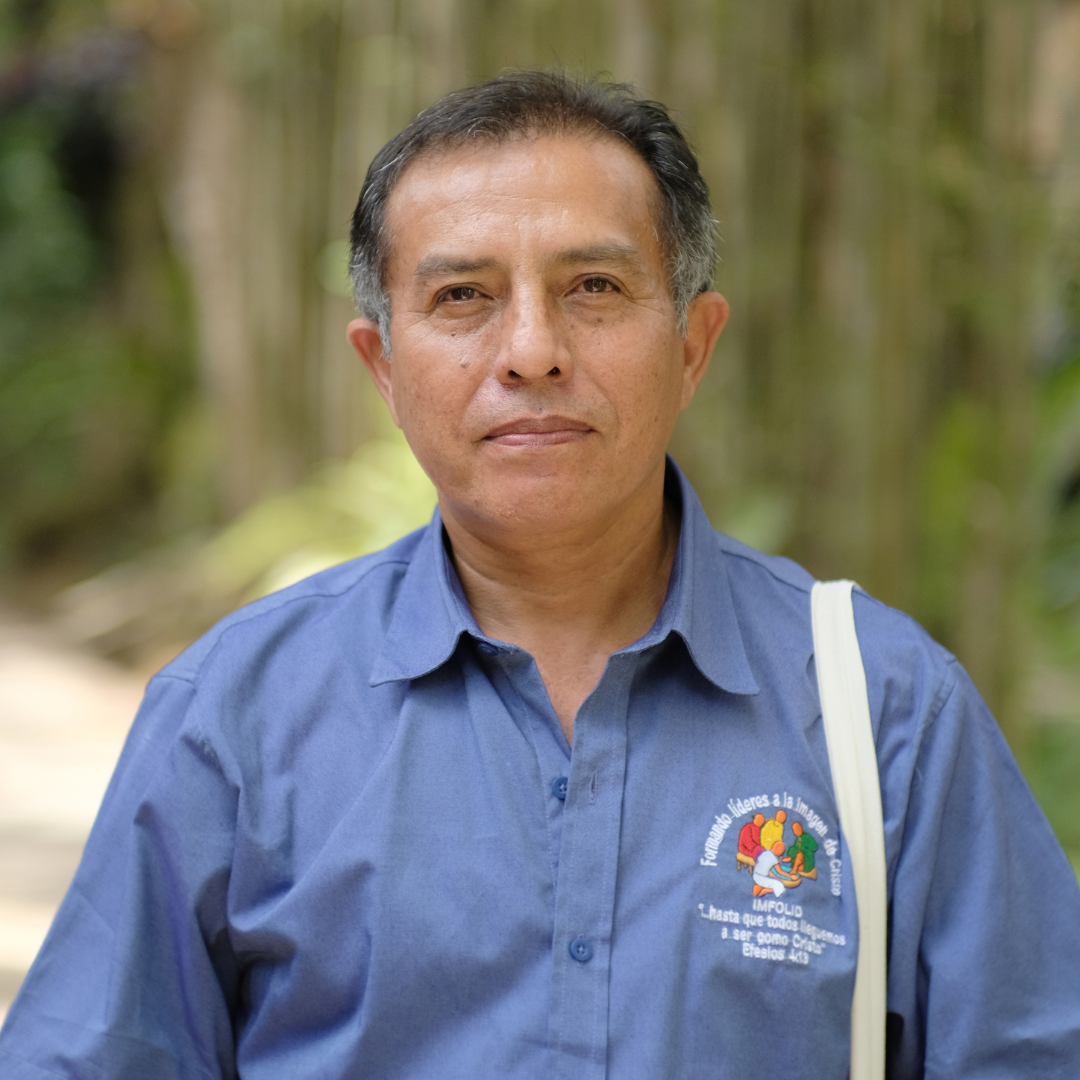Posted: August 30, 2023
Choose texts (one or several) that work for your congregation in your context.
Job 42:1-6
Becoming a servant of a sovereign and just God
Have we ever questioned the sovereignty and justice of God? It was not easy for Job to understand the situation he lived through, and he made it clear that he was angry with God. Later he repented of his attitude, and he recognized the great power and perfect justice of God.
God is still sovereign over the bigger picture. Jesus said that anyone who would give up something for the kingdom of God would be rewarded.
In my context, currently violence in all its forms has taken over all layers of Colombian society. I did not understand how far the mercy of God would go in my work to train people for a specific ministry with the suffering population (elderly people and migrants of all ages).
- How do we hear God and see God when our eyes see the suffering of the migrants daily?
- The widow’s torn heart?
- The violence exerted on the orphan?
- The fear of the pregnant woman who flees from the violent parent?
- The abuse toward the young woman and the child who has been rejected?
The call to the church is to take measures to reduce pain in all its forms in its context, forming a new people that sows peace, harmony, tranquility and truth. Those instructed in the Word of God are transformed in their hearts to make decisions by faith to remain in the light of the gospel. It is there that the text from Job comes to life, with eyes to see the care, the love and the mercy of the living God taking human form as it walks with the weak, the needy, the exiled, the ones who have suffered violence.
The harmony of “my peace I leave you, my peace I give you: not as the world gives it, I give it” (John 14:27) is the treasure of a heart renewed and transformed by the power of the Word that feels the pain of sisters and brothers, and even gives its life for them.
In my context, those who suffer (Venezuelan refugees and the elderly) invite us to accompany them, to be cared for in their pain by those who feel their affliction alongside them.
Only Jesus Christ in us gives us the ability to walk alongside and accompany those who suffer.
In my context, the elderly who are abandoned and the Venezuelan refugees are images that form a new cultural mosaic. These are people who enrich our culture by bringing in diverse visions, giving birth to new cultures.
The main question of the book of Job does not go away: “Why do believers experience problems and suffering?”
Would Job’s message have changed if God had not restored him to his former blessings? No.
God is in control of the bigger picture. The journey of faith, even amid suffering, is the way of life.
|
|
—Maria Del Rosario Peña De Melo, Iglesia Cristiana Encuentro de Renovación y Restauración, Comunidad Menonita de Riohacha, Colombia |
Psalm 8
Becoming part of God’s bigger picture
This is the first psalm of praise in the book of Psalms, an entire song of praise and worship.
This psalm declares the immense beauty and size of God’s creation, the earth and all the heavens. It helps us offer our praise and worship to God, whose glory is bigger than Creation (verses 1, 3, 5-8). God’s majestic sovereignty is revealed in two quite different ways: in the heights of heaven and in the dust of the earth. God’s picture is big.
God reveals God’s majesty by defeating enemies through the weakness of children and infants. God displays God’s glory by using weak people to do God’s great work (verses 2, 4-6). God is still in engaged in displaying God’s glory through weak people like you and like me.
David asks the same philosophical question that Job and many others ask (verse 4): “what are humans that you are mindful of them, mortals that you care for them?” Rather than focusing on unfair suffering, David celebrates the fact that God has given us glory and honour beyond our deserving. God put us in charge of this world, not to abuse it, but to care for it, to protect it and to make the most of it, by becoming part of God’s bigger picture.
|
|
—Arli Klassen, First Mennonite Church, Kitchener, Canada. |
John 10:14-16
Becoming part of God’s great panorama
There are times when we wonder how God forms a specific people, starting with one person and their family in the Old Testament. God established a covenant with the patriarchs, with specific conditions that must be fulfilled for them to be the people of God.
But what about the other people who are not born into this (blood) family that God has chosen? How is it possible to be part of the people of God?
This is precisely what the gospel is about, “the good news” that tells us that through Jesus Christ we are all welcome to be part of this people of God, this family of God.
God calls, and we respond.
We come from different parts of the world, with different customs and languages and ideas, but with Jesus Christ we can be one, we are the people of God. Jesus Christ is our Guide, our Shepherd who goes before us to walk in the perfect will of God.
Let us see how the Gospel of John shows us how Jesus is our guide and our shepherd, and who we are because of Jesus.
What do we learn about the Shepherd, Jesus Christ?
Jesus our Shepherd is good and kind. This is experienced by all, transmitting confidence to all the followers of Jesus. Jesus Christ loves everyone equally.
Jesus our Shepherd knows the Father and the Father knows the Shepherd. We learn to know Jesus, the one we follow, and knowing that Jesus is well known by the one who sends Jesus also gives us confidence. A deep relationship between the two (Father and Son) is necessary and they are one.
Jesus our Shepherd knows his sheep and his sheep know him. Of course, the Shepherd knows well the sheep that belong to his flock, and so do the sheep know him as their own Shepherd. The Shepherd spends time with them to get to know them well, and so that they can know him. Jesus Christ knows each person who follows him. He knows and understands each need or difficulty that his followers go through.
Jesus our Shepherd is willing to lay down his life for his sheep. This willingness is true, even though they are not all “good” sheep or “good” followers. Jesus Christ gave his life and shed his blood to save all people.
Jesus our Shepherd welcomes other sheep too. The Shepherd not only takes care of the sheep that are already in his fold; he keeps calling other sheep that are looking for a shepherd to guide them. He does not reject anyone and wants the other sheep to come to him because he gave his life for all of them.
What do we learn about the sheep in the flock?
The sheep get to know their guide, their shepherd. They do this by spending time with their leader and being willing to learn from him. It is only by knowing Jesus Christ, and following his example, that we can grow in our faith.
What do we learn about the other sheep?
All the sheep are welcome. The other sheep outside are apparently lost and need a home, someone to watch over them and must be brought into the flock. They are welcome in the family of God.
The other sheep will also learn to be obedient. They will also learn to know their good shepherd as well as all the rest of the sheep in the flock. They will be part of the family of God.
In summary:
The people of God are the flock who follow Jesus the good Shepherd as their guide.
Jesus the good Shepherd is the one who leads the people of God, who has gone in front as a model for us all.
All the people of God follow Jesus by getting to know him and forming one people, and thus are one people within God’s will.
|
|
—Mirta Pérez, Campo Alegre, Convención Evangélica Hermanos Menonitas Nivacle, Neuland Colony, Paraguay. |
Ephesians 4:1-6
Living in unity
Goal: That the church understands the importance of living in unity.
One of Jesus’ greatest concerns before his ascension was that the church, his body on earth, remain united. In Jesus’ final prayer, Jesus asked his Father that believers might be one, so that the world might believe his message (John 17:21-23).
The effectiveness of Christian witness is directly related to the uniqueness of Christian unity. Throughout history, there have been many kingdoms, governments, coalitions, companies, societies and even churches that have divided and even disappeared due to lack of unity. Paul’s first point about the worth of Christian commitment requires unity among believers. Each congregation can only make an impact in the community when we walk together in the bond of peace.
But it is difficult to walk in unity.
A. Walking in unity requires disciplined attitudes.
- Unity requires braveness and courage. (Ephesians 4:1, 1 Corinthians 16:13)
- Illustration: Alexander the Great had in his army a soldier who was fearful, skittish and cowardly in battle. This soldier was named Alexander. On a certain occasion the king called him, and after talking to him for a while, quite angrily told him: “Change your name, or behave like an Alexander!”
- All those who call themselves Christians must behave as followers of Jesus Christ: being faithful to him, imitating him, obeying him, following him... or change your name; but do not say that you are Christian.
- Unity requires humility (Ephesians 4:2, Romans 12:3, Philippians 2:3)
- Unity requires gentleness and patience (Ephesians 4:2, Isaiah 53:7, Matthew 5:5-9)
B. Walking in unity requires ceaseless attention (Ephesians 4:2-3)
- We are asked to continually bear with one another in love; and to keep the unity of the Spirit in the bond of peace.
- Unity requires being with my neighbour. It requires being supportive of my friends, such as putting up with their bad temper, their jokes and maybe… their bad smells.
- Unity requires consideration and diligence. It means acting with consideration to preserve unity and being diligent and quick to protect it. It means doing everything possible on one’s part to save unity.
- We are asked to do these things because we are one in Christ (Ephesians 4:4-6)
Application:
- Do your actions and reactions enhance or destroy the unity of our church?
- How can you do something concrete to contribute to the unity of our church?
- Make the solemn decision that if something does not unify or build, you will not say it and you will not do it.
- In this coming year, are we each willing to work at unity?
- God created unity. It is our task to protect unity in the church.
|
|
—Freddy Barrón, Iglesia Evangélica Menonita Boliviana – Sinaí, Santa Cruz, Bolivia. |







Join the Conversation on Social Media
FacebookTwitterInstagramFlickrYouTube